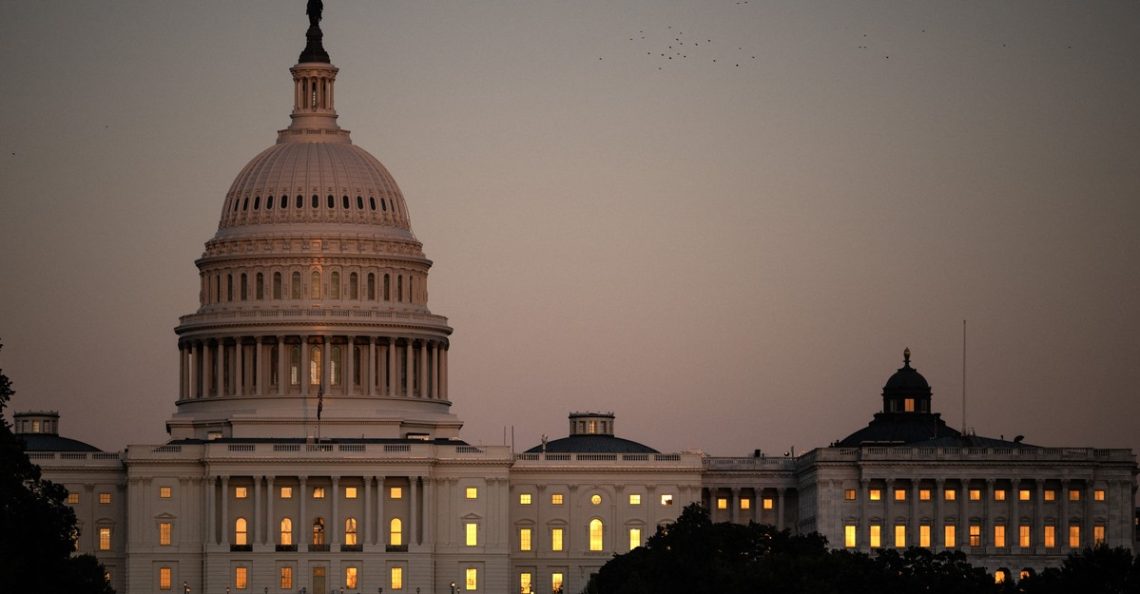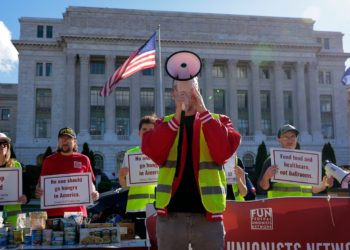President Donald Trump’s theory of executive power does not lend much weight to the views of his predecessors—especially those who happen to be Democrats. But as the government shutdown enters its second month, Trump is showing an odd degree of respect for legal guidance first adopted under a president he has mocked: Jimmy Carter.
Government shutdowns are a relatively modern phenomenon. For most of America’s nearly 250-year history, a lapse in congressional appropriations forced federal agencies to limit their spending, but not to close entirely. That changed only under Carter. In 1980, his attorney general, Benjamin Civiletti, wrote a memo in which he argued that according to federal law, the government could not operate once funding bills expired. The era of shutdowns had begun, and from that point on, legislative impasses over spending have put hundreds of thousands of federal employees out of work and reduced government services for millions more.
The way the United States handles these spending gaps—deeming many workers essential while furloughing the rest—is unusual, Philip Wallach, a senior fellow at the American Enterprise Institute who studies the separation of powers, told me. “It’s a very strange practice,” he said. “It’s not like shutdowns are a feature of governments everywhere.”
Not even Civiletti realized how significant his memo would become. “I couldn’t have ever imagined these shutdowns would last this long of a time and would be used as a political gambit,” he told The Washington Post in 2019, in the midst of what was then the longest shutdown in U.S. history. He said his opinion “has been used in ways that were not imagined at the time.” (Civiletti died in 2022.)
For the past 45 years, presidents in both parties have adhered to Civiletti’s interpretation of the Antideficiency Act, the 19th-century law that governs federal spending. But Trump could take a different view. His administration “could come up with a revised interpretation of the Antideficiency Act that’s totally reasonable,” Matthew Glassman, a senior fellow at Georgetown University and a former congressional-appropriations aide, told me.
Indeed, it’s easy to see how Trump might warm to an idea that would free him to unilaterally end the shutdown without making concessions to Democrats. He has already allowed his budget director, Russell Vought, to enforce federal spending laws during a shutdown far more selectively than previous presidents, and he has ordered his attorney general, Pam Bondi, to take actions much more significant than revising the government’s interpretation of a statute that dates to 1870. “It would have been more difficult to picture past presidents heading in that direction than it would be to picture Trump,” Glassman said. “It would be in line with his thinking and something that he certainly would not have any qualm with.”
During funding gaps before 1980, the government advised federal agencies to “avoid hiring, grantmaking, nonemergency travel, and other nonessential obligations,” Civiletti wrote in his memo to Carter. The White House could return to that practice or, Wallach said, it could simply treat all federal employees the way “essential employees” are treated during a shutdown: They work without pay, under the expectation that they’ll be paid retroactively once Congress enacts a new spending bill.
A more dramatic step would be to keep the government operating as normal during a lapse of appropriations. Over the years, Republican members of Congress have introduced variations of a proposal known as the “End Government Shutdowns Act” that would keep agencies open continuously while directing them to reduce spending by 1 percent (or more, depending on the legislation). None of those bills have made it into law, however, and a unilateral move by Trump to put the government on autopilot would be much harder to defend as being consistent with the Antideficiency Act’s bar on incurring obligations not “authorized by law.” More broadly, Wallach argued, it would threaten Congress’s constitutional control over spending altogether.
“That sounds dangerously close to, Hey, let’s put Congress out of business,” he told me. “Frankly, we’re already hurtling in that direction.”
Democrats might have welcomed a new interpretation of the Antideficiency Act during the Clinton and Obama administrations, when congressional Republicans began taking routine funding extensions as legislative hostages, leading to multiple shutdowns. But now they would surely view such a move as one more power grab by a president who has delighted in Congress’s fading relevance. Representative Rosa DeLauro of Connecticut, the top Democrat on the House Appropriations Committee, told me that allowing the administration to keep the government open during a funding gap would be akin to handing the White House a blank check. “When would you reevaluate budgets? Who would check the executive branch?” DeLauro asked. “What if Congress never weighed in?”
As my colleagues and I reported earlier this week, Trump has displayed no particular urgency to end the shutdown, even as it nears the record length of 35 days set during his first term. Yesterday, he called on Republicans to scrap the Senate filibuster, which would allow them to reopen the government without relying on Democratic votes. (GOP leaders have long opposed eliminating the filibuster, making such a move highly unlikely anytime soon.) When I asked the White House whether the administration might revisit the Carter-era shutdown guidance it was following, the spokesperson Abigail Jackson did not answer directly. “The Trump administration wants the Democrats to end their pathetic stunt, stop hurting the American people, and reopen the government,” she replied by email.
As for Civiletti, he might not have foreseen the impact his 1980 legal opinion would have on nearly half a century (and counting) of legislative brinkmanship; it took another 15 years for government shutdowns to become the political weapon they are today. But at least one of Civiletti’s surviving lieutenants says he was—and is—right about the law. “It was absolutely straightforward,” John Harmon, who directed the Justice Department’s Office of Legal Counsel during the Carter administration and advised Civiletti on the memo, told me by phone this week. The Antideficiency Act “says you can’t spend money that’s not been appropriated by Congress,” he said. “It was clear on its face.”
The way to keep the government open when funding lapses isn’t to reinterpret an old law, Harmon argued, but to amend or repeal it. “Congress,” he said, “can fix this.” Don’t hold your breath, however, waiting on lawmakers to agree on a plan to prevent future shutdowns—they’re having enough trouble finding a way out of the one they’re in.
The post How Trump Could End the Shutdown on His Own appeared first on The Atlantic.



